In Focus This Week
Humans In the Loop
Building trust in elections with bipartisan messaging
By: Thessalia Merivaki, Ph.D., Associate Teaching Professor & Associate Research Professor, McCourt School of Public Policy & the Massive Data Institute
While many state and local election officials (EOs) are themselves elected through partisan processes, their statutory role is to conduct elections in a nonpartisan manner. Perceptions among the public that EOs act on their partisanship when administering elections has contributed to the decline in trust in the integrity of US elections. Low trust has also coincided with increases in threats and attacks on election officials and the election workforce, who have been retiring in record numbers, resulting in the loss of veteran election talent with significant institutional knowledge.
Despite U.S. elections being more secure than ever, American voters persistently express skepticism about election security as well as the ability of election officials to take their partisan hats off while performing their election duties. This skepticism is colored by party, with Republican voters highly skeptical of their out-partisan election officials, and vice versa. The spillover of polarization into election administration creates a challenge for EOs: How can public trust in elections be built when the election infrastructure itself contains both partisan ((s)election of election officials) and nonpartisan (conduct of elections) elements?
Elections from a PR Lens: Bipartisanship as a Trust-building Messaging Strategy
The increase in elite-driven false narratives about the integrity of U.S. elections, combined with low familiarity among the public about how election procedures are conducted within their states as well as other states, have made a long-lasting impact on voters’ confidence that votes cast are accurately counted. These attitudes are usually apparent when election winners are announced; voters whose preferred candidate loses are more likely to express low confidence that votes were counted as intended (the loser effect). However, these attitudes historically fade over time. In recent years, low trust among the public, and particularly partisan gaps in trust, have raised alarms in the election community because they reflect signs of a democracy in crisis.
In response to disinformation and declining voter confidence, EOs invested in trust-building messaging campaigns to communicate to voters that a. EOs are a trusted source of information, and b. that the election process is secure. These messages were added to EOs’ “voter education toolkit” which primarily included communications about how and where to vote. Trust-building communications were effective in helping mitigate election denial and the loser effect in the 2020 and 2022 federal elections.
In anticipation of the 2024 election, with one of the two major presidential candidates perpetuating distrust in the integrity of the election infrastructure, EOs revised their messaging strategies and focused more on providing greater context when communicating about election security. They explained how election procedures are conducted, who is involved in securing them, and why these protocols ensure that elections are secure. A major emphasis was placed on the checks and balances embedded in elections, noting that processes are conducted on a bipartisan basis as specified in state election law; from how poll workers are recruited and trained, how mail ballots are processed, to how election results are audited and certified.
Tracking EOs Communications: The 2024 Election Officials Communications Tracker
To understand how EOs integrated bipartisan messaging into their trust-building voter communications during the 2024 Presidential election, I leverage data collected from the 2024 Election Officials Communications Tracker. The Tracker monitors and analyzes organic communications from state and local election officials on mainstream social media platforms (Facebook, Instagram, Threads, X, TikTok, YouTube) shared between August 28, 2024 and December 15, 2024, amounting to over 60,000 posts. This timeframe captures the most active election communications period, starting with the National Poll Worker Recruitment Day (August 28, 2024) and ending with state certification of election results (December 15, 2024).
During this period, election officials educated voters about registering to vote, requesting a mail ballot, where to vote, how to serve as poll workers, how to observe election procedures like voting machine testing, vote counting and audits, among other election-related information. They also communicated about outreach activities in different communities, responded to false narratives that circulate online, and shared communications about election security.
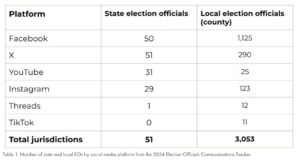
Table 1 shows the presence of state and local EOs that the Tracker covers by platform, which essentially measures the presence of EOs on mainstream social media platforms. As the Table shows, all state officials were present on Facebook and X in 2024 (Ohio maintained two accounts: one from the Secretary of State’s office and one titled “Verify Ohio,” which is the office’s Public Integrity Division). Local EOs’ presence is spottier and predominantly found on Facebook. Of course, absence from social media does not mean that EOs are not communicating with voters. However, geographic and platform diversity (see Figure 1) provide important insights as to the different ways EOs communicate with voters in digital spaces.
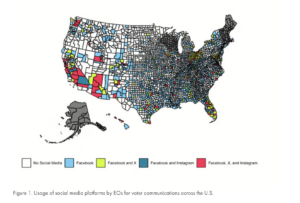
With the assistance of student researchers, social media content was labeled using a hierarchical, nested taxonomy of election administration labels. These labels aim to capture what type of processes EOs communicate about, which communication strategies they use–misinformation-combatting, trust-building, get out the vote–what type of outreach they conduct offline and to which communities, and how they communicate about election security. We apply the trust-building label on content that intentionally communicates messages about trust in elections (Figure 2), as specified in national campaigns such as the National Association of Secretaries of State (NASS) #TrustedInfo campaign. These messages communicate that: election officials are trusted sources of information (Trust the source), election procedures are secure (Trust the process), and the people associated with running elections are professionals (Trust the people).
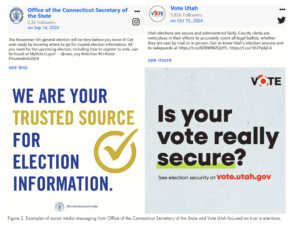
Humans in The Loop: Identifying and Classifying Bipartisan Messages
We draw from communications labeled as “trust-building” (see Figure 3 for examples) to determine whether messages integrate bipartisan language when describing election procedures. This classification process is manual, as such messages were conveyed in multi-modal formats (text, video, images) and automatic labeling approaches did not adequately identify all relevant content.
Among 13,640 posts shared by state EOs across all tracked platforms, about 16.4% were labeled as “trust-building”, with 3.3% explicitly referencing bipartisan procedures. Local EOs’ trust-building messages took about 6.1% of all election-related content (46,600 posts in total), and less than 1% included bipartisan language. Election procedures referenced under this theme fell into six categories: voter list maintenance, poll workers and EOs, ballot processing, ballot proofing, mail ballot processing and signature verification, and post-election processes (audits and certification).
Even though the volume of trust-building–and bipartisan–messages is low compared to all election-related content that EOs disseminate to voters, the content of these communications uncover intentional messaging strategies that go beyond simply stating “elections are secure”. For instance, New York State Board of Election’s #12DaysOfElectionSecurity campaign notes that “voter lists are routinely maintained. This occurs year-round to ensure voter rolls are updated. The tasks are completed by bipartisan staff at each board of elections”. Similarly, Cuyahoga County, Ohio published standards of conduct emphasizing that EOs work in teams and engage with voters in a nonpartisan manner (Figure 3).
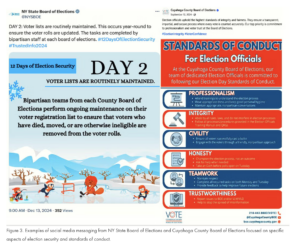
Can Bipartisanship Restore Public Trust in Elections?
While statutory requirements for bipartisan involvement exist throughout the election process, officials referenced only a fraction of these safeguards in their public communications during the 2024 Presidential election cycle. This suggests untapped potential for building public confidence by highlighting existing checks and balances in the election process that rely on bipartisan cooperation and oversight.
The Election Officials Communication Tracker data also show variation in messaging strategies across jurisdictions and platforms. Some officials lean heavily on process-based explanations, while others emphasize the people involved in election administration. Understanding these patterns can inform more effective, evidence-based communication strategies.
Thus far, experimental research shows that humanizing elections and educating voters about election procedures like audits can move the needle in building confidence in election results. The next step, therefore, is to experimentally test whether framing election integrity through a bipartisan lens reduces polarized attitudes about the accuracy of election results.
(This article was cross-posted from the Georgetown University McCourt School of Public Policy.)
electionline Daily News Email
 What’s the best part of waking up? electionline Daily News in your inbox of course so be sure to sign up for your daily dose.
What’s the best part of waking up? electionline Daily News in your inbox of course so be sure to sign up for your daily dose.
Each morning you’ll receive the top headlines of the day, plus a listing of states featured in that day’s news round up.
To sign up, simply visit our site and provide us with your email and you’ll begin receiving the news in your inbox each morning.
We Google so you don’t have to!
electionline Merch
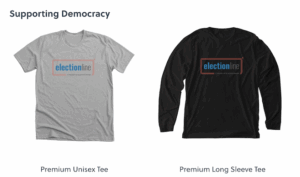 You’ve asked for it, well now you’ve got it! Just in time for all of your holiday gift-giving. We’ve opened up an electionline merch store using Bonfire. Currently we’re offering a couple of different t-shirts, a long-sleeve t-shirt and a hoodie.
You’ve asked for it, well now you’ve got it! Just in time for all of your holiday gift-giving. We’ve opened up an electionline merch store using Bonfire. Currently we’re offering a couple of different t-shirts, a long-sleeve t-shirt and a hoodie.
Election News This Week
 Federal Update: New rules from the U.S. Postal Service went into effect over the holidays that have the potential to affect millions of voters. Under the new rules, the Postal Service announced that it may not postmark a piece of mail on the same day that it takes possession of it. The change could affect thousands of people who vote by mail in places that allow mail ballots to be counted if they are received after Election Day but postmarked by Election Day. Those policies are in effect in 14 states — Alaska, California, Illinois, Maryland, Massachusetts, Mississippi, Nevada, New Jersey, New York, Oregon, Texas, Virginia, Washington, and West Virginia — along with the District of Columbia, Guam, Puerto Rico, and the U.S. Virgin Islands. The new guidance means that, even if a voter delivers their ballot to the Postal Service by Election Day, it may nevertheless be rejected if it is not postmarked that day. The USPS defended the change in a lengthy response to criticisms published in the Federal Register. The agency emphasized that it does not administer elections and doesn’t advocate for or against voting by mail. The postal service repeated its advice that voters mail their completed ballots at least a week before Election Day. And it noted that voters may request a manual postmark at their local post office free of charge. “If customers are aware that the postmark date may not align with the date on which the Postal Service first accepted possession of a mailpiece, they will be better equipped to adjust their plans accordingly,” the response reads. “And if policymakers or other entities that create rules utilizing the postmark date are aware of what the postmark date signifies, they are better equipped to determine whether their rules adequately serve their purposes.” At least one postal union leader says that this is a change from current practice and that, previously, mail would typically be postmarked for the day it came in, even if it was processed later. “I think it’s a huge deal,” said Charles Charleston, president of the National Postal Mail Handlers Union Local 311, which represents mail handlers in Texas.
Federal Update: New rules from the U.S. Postal Service went into effect over the holidays that have the potential to affect millions of voters. Under the new rules, the Postal Service announced that it may not postmark a piece of mail on the same day that it takes possession of it. The change could affect thousands of people who vote by mail in places that allow mail ballots to be counted if they are received after Election Day but postmarked by Election Day. Those policies are in effect in 14 states — Alaska, California, Illinois, Maryland, Massachusetts, Mississippi, Nevada, New Jersey, New York, Oregon, Texas, Virginia, Washington, and West Virginia — along with the District of Columbia, Guam, Puerto Rico, and the U.S. Virgin Islands. The new guidance means that, even if a voter delivers their ballot to the Postal Service by Election Day, it may nevertheless be rejected if it is not postmarked that day. The USPS defended the change in a lengthy response to criticisms published in the Federal Register. The agency emphasized that it does not administer elections and doesn’t advocate for or against voting by mail. The postal service repeated its advice that voters mail their completed ballots at least a week before Election Day. And it noted that voters may request a manual postmark at their local post office free of charge. “If customers are aware that the postmark date may not align with the date on which the Postal Service first accepted possession of a mailpiece, they will be better equipped to adjust their plans accordingly,” the response reads. “And if policymakers or other entities that create rules utilizing the postmark date are aware of what the postmark date signifies, they are better equipped to determine whether their rules adequately serve their purposes.” At least one postal union leader says that this is a change from current practice and that, previously, mail would typically be postmarked for the day it came in, even if it was processed later. “I think it’s a huge deal,” said Charles Charleston, president of the National Postal Mail Handlers Union Local 311, which represents mail handlers in Texas.
In other news, according to the Atlanta Journal-Constitution and Los Angeles Times, attorneys who pushed 2020 election conspiracy theories now work for the Department of Justice. According to the Times, Eric Neff, whose tenure at the Los Angeles County district attorney’s office ended after he was placed on administrative leave in 2022 over accusations of misconduct in the prosecution of the CEO of Konnech, a software company that election conspiracy theorists said was in the thrall of the Chinese government is serving as one of the Trump administration’s top election watchdogs. Late last year, his name began appearing on lawsuits filed by the U.S. Department of Justice’s Civil Rights Division, listed as “acting chief” of the voting section. And per the AJC, DOJ attorneys suing Fulton County over 2020 data and the state’s unredacted voter rolls have a history of representing Republican activists in Georgia election disputes.
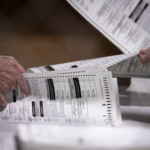 Talk to the Hand: Republicans in two Texas counties – Dallas and Hays – have backed off plans to hand count ballots in the March 2026 primary. In a statement posted on social media, Dallas County Republican Party Chairman Allen West said he decided to work with the county to “conduct a precinct-based, community, separate Election Day electoral process.” The move, he said, “reduces the liabilities” of the party. “In this case, discretion is the better part of valor.” According to Votebeat, the decision reverses months of statements suggesting the party was seriously preparing to count tens of thousands of Election Day ballots by hand — a move that would have affected all Dallas County voters, regardless of party. Hays County Republicans said that they couldn’t get enough voting machines for disabled voters at their precincts and that the county wasn’t able to get them the voting data that would have allowed them to prepare and consolidate precincts. “Proceeding without these elements would have placed our party and voters at significant legal, financial, and operational risk, and could have undermined the very integrity we have been striving to defend,” county party Chairwoman Michelle M. López said in a letter Dec. 22. The decision by Dallas County has created another problem though. Dallas County residents voting in the Republican or Democratic primary must now vote at their own designated polling location on primary Election Day in March instead of countywide vote centers. Dallas County elections administrator Paul Adams said it creates challenges. “I realize that is going to be very confusing, as this has not happened in Dallas County in a number of years,” he said. The number of early voting polling locations will also be cut from 450 to a minimum of 250. “I’m going to do the best that I can,” Adams said. “Our staff is going to do the best that they can. But there’s certainly a lot of hurdles to overcome, particularly for voter education.”
Talk to the Hand: Republicans in two Texas counties – Dallas and Hays – have backed off plans to hand count ballots in the March 2026 primary. In a statement posted on social media, Dallas County Republican Party Chairman Allen West said he decided to work with the county to “conduct a precinct-based, community, separate Election Day electoral process.” The move, he said, “reduces the liabilities” of the party. “In this case, discretion is the better part of valor.” According to Votebeat, the decision reverses months of statements suggesting the party was seriously preparing to count tens of thousands of Election Day ballots by hand — a move that would have affected all Dallas County voters, regardless of party. Hays County Republicans said that they couldn’t get enough voting machines for disabled voters at their precincts and that the county wasn’t able to get them the voting data that would have allowed them to prepare and consolidate precincts. “Proceeding without these elements would have placed our party and voters at significant legal, financial, and operational risk, and could have undermined the very integrity we have been striving to defend,” county party Chairwoman Michelle M. López said in a letter Dec. 22. The decision by Dallas County has created another problem though. Dallas County residents voting in the Republican or Democratic primary must now vote at their own designated polling location on primary Election Day in March instead of countywide vote centers. Dallas County elections administrator Paul Adams said it creates challenges. “I realize that is going to be very confusing, as this has not happened in Dallas County in a number of years,” he said. The number of early voting polling locations will also be cut from 450 to a minimum of 250. “I’m going to do the best that I can,” Adams said. “Our staff is going to do the best that they can. But there’s certainly a lot of hurdles to overcome, particularly for voter education.”
 Da’Youth: In a first-of-its-kind initiative in Illinois, the office of Cook County Clerk Monica Gordon, in partnership with the Chicago Bears, is bringing official early voting sites into more than 20 suburban high schools across Cook County ahead of the March 17 Gubernatorial Primary Election. The program—called “Defenders of DA’mocracy”—was formally announced this week at John Hersey High School in Arlington Heights. The initiative trains high school students to serve as official Election Judges and operate on-campus early voting locations at the start of the Early Voting period. Students from 24 Cook County high schools are undergoing training this week to learn the fundamentals of election administration, including voter check-in procedures, ballot handling, and voting equipment operations. Once training is complete, participating students will be responsible for running early voting sites at their respective schools, offering peers a hands-on opportunity to engage with the electoral process in a real-world setting. According to the Clerk’s Office, the program is designed to deepen civic engagement among young people while expanding access to early voting across the county. By placing students directly in Election Judge roles, the initiative blends classroom learning with public service and underscores the importance of preparation, teamwork, and integrity in the democratic process. As part of the partnership, the Chicago Bears will serve as a Community Civic Engagement Supporter. The organization will provide Bears-branded items to student participants and share a brief video message from a Bears player encouraging youth participation in civic life. “I want to get involved, help people vote and help democracy,” said 17-year-old Melissa Loch, “because I want to be a part of that one day.” And to her, Loch continued, there was no better way than learning how the voting process works from the ground up. We haven’t been this excited about something Bears-related since the Super Bowl Shuffle.
Da’Youth: In a first-of-its-kind initiative in Illinois, the office of Cook County Clerk Monica Gordon, in partnership with the Chicago Bears, is bringing official early voting sites into more than 20 suburban high schools across Cook County ahead of the March 17 Gubernatorial Primary Election. The program—called “Defenders of DA’mocracy”—was formally announced this week at John Hersey High School in Arlington Heights. The initiative trains high school students to serve as official Election Judges and operate on-campus early voting locations at the start of the Early Voting period. Students from 24 Cook County high schools are undergoing training this week to learn the fundamentals of election administration, including voter check-in procedures, ballot handling, and voting equipment operations. Once training is complete, participating students will be responsible for running early voting sites at their respective schools, offering peers a hands-on opportunity to engage with the electoral process in a real-world setting. According to the Clerk’s Office, the program is designed to deepen civic engagement among young people while expanding access to early voting across the county. By placing students directly in Election Judge roles, the initiative blends classroom learning with public service and underscores the importance of preparation, teamwork, and integrity in the democratic process. As part of the partnership, the Chicago Bears will serve as a Community Civic Engagement Supporter. The organization will provide Bears-branded items to student participants and share a brief video message from a Bears player encouraging youth participation in civic life. “I want to get involved, help people vote and help democracy,” said 17-year-old Melissa Loch, “because I want to be a part of that one day.” And to her, Loch continued, there was no better way than learning how the voting process works from the ground up. We haven’t been this excited about something Bears-related since the Super Bowl Shuffle.
 Podcast News: In the latest episode of High Turnout Wide Margins hosts Eric Fey and Brianna Lennon speak with Ben Ginsberg and Bob Bauer. These two longtime and respected election experts launched a national effort called Pillars of the Community in 2024. This program aims to educate and answer questions from trusted community members who can then assist in the fight against election dis- and misinformation. The premier episode of Bearing Scars features Nobel Peace Prize nominee and one of Time Magazine’s 100 Most Influential People in the World Desmond Meade discussing his two decade journey from homeless drug addict moments away from ending it all to sobriety, college, law school, and international prominence. Former Seminole County, Florida Supervisor of Elections host Michael Ertel and Meade delve into the heart of forgiveness and second chances.
Podcast News: In the latest episode of High Turnout Wide Margins hosts Eric Fey and Brianna Lennon speak with Ben Ginsberg and Bob Bauer. These two longtime and respected election experts launched a national effort called Pillars of the Community in 2024. This program aims to educate and answer questions from trusted community members who can then assist in the fight against election dis- and misinformation. The premier episode of Bearing Scars features Nobel Peace Prize nominee and one of Time Magazine’s 100 Most Influential People in the World Desmond Meade discussing his two decade journey from homeless drug addict moments away from ending it all to sobriety, college, law school, and international prominence. Former Seminole County, Florida Supervisor of Elections host Michael Ertel and Meade delve into the heart of forgiveness and second chances.
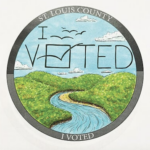 Sticker News: Congratulations to Eureka High School students Sophomore Ady Vessells, 15, and senior Kate Feeney, 18 who each won first place in separate categories for this year’s St. Louis County, Missouri “I Voted” sticker design contest. Feeney’s sticker design will be professionally printed and handed out to voters on various election days in 2026. Vessells’ “Future Voter” sticker design, complete with a bald eagle and fireworks, will be printed next year for children in St. Louis County. This is the first time the St. Louis County Board of Elections and St. Louis County Library, which organize the contest jointly, have held a future voters sticker design category. Nearly 4,000
Sticker News: Congratulations to Eureka High School students Sophomore Ady Vessells, 15, and senior Kate Feeney, 18 who each won first place in separate categories for this year’s St. Louis County, Missouri “I Voted” sticker design contest. Feeney’s sticker design will be professionally printed and handed out to voters on various election days in 2026. Vessells’ “Future Voter” sticker design, complete with a bald eagle and fireworks, will be printed next year for children in St. Louis County. This is the first time the St. Louis County Board of Elections and St. Louis County Library, which organize the contest jointly, have held a future voters sticker design category. Nearly 4,000  votes were cast in the 2025 sticker design contest, according to the Board of Elections. Feeney said she’s eager to vote for the first time in 2026 for several reasons. “I just turned 18, and now I get to vote and get my sticker at the same time,” she said. “It makes me even more excited to vote in the next election because I’ll be seeing my own sticker on my shirt and then on random people’s shirts.” Art teacher Diane Bashirian said she is “immensely proud” of her students. She’s had her students submit their work in the contest in the past, but this is the first time any have won. Vessells and Feeney are in Bashirian’s art and design applications class. “I was thrilled when I found out they both won,” Bashirian said. “I showed them past examples, which I think were helpful, and then we talked about how to be
votes were cast in the 2025 sticker design contest, according to the Board of Elections. Feeney said she’s eager to vote for the first time in 2026 for several reasons. “I just turned 18, and now I get to vote and get my sticker at the same time,” she said. “It makes me even more excited to vote in the next election because I’ll be seeing my own sticker on my shirt and then on random people’s shirts.” Art teacher Diane Bashirian said she is “immensely proud” of her students. She’s had her students submit their work in the contest in the past, but this is the first time any have won. Vessells and Feeney are in Bashirian’s art and design applications class. “I was thrilled when I found out they both won,” Bashirian said. “I showed them past examples, which I think were helpful, and then we talked about how to be 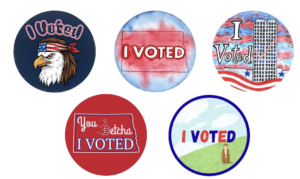 patriotic and show patriotism.” Voting is now open for the 2026 North Dakota “I Voted” sticker. From kindergarteners to grandparents, 478 entries from 72 communities were submitted, the Secretary of State’s Office said. The finalists feature a bald eagle, a prairie dog, the state Capitol building, a water color design and the “you betcha” phrase. “I was impressed by the number of entries we received and the variety of designs. It was a true reflection of creativity and civic pride from across our state,” Secretary of State Michael Howe said in a news release. And this week, West Virginia Secretary of State Kris Warner announced the launch of a statewide contest inviting all West Virginia 8th grade students to design an “I Voted!” sticker to be distributed in their home county during the 2026 election cycle. “Voting is the cornerstone of our constitutional republic,” said Warner. “By involving students in this contest, we hope to inspire the next generation of voters and encourage them to take pride in participating in elections.”
patriotic and show patriotism.” Voting is now open for the 2026 North Dakota “I Voted” sticker. From kindergarteners to grandparents, 478 entries from 72 communities were submitted, the Secretary of State’s Office said. The finalists feature a bald eagle, a prairie dog, the state Capitol building, a water color design and the “you betcha” phrase. “I was impressed by the number of entries we received and the variety of designs. It was a true reflection of creativity and civic pride from across our state,” Secretary of State Michael Howe said in a news release. And this week, West Virginia Secretary of State Kris Warner announced the launch of a statewide contest inviting all West Virginia 8th grade students to design an “I Voted!” sticker to be distributed in their home county during the 2026 election cycle. “Voting is the cornerstone of our constitutional republic,” said Warner. “By involving students in this contest, we hope to inspire the next generation of voters and encourage them to take pride in participating in elections.”
Personnel News: Waukesha County, Wisconsin Clerk Meg Wartman has announced plans to retire midterm following a 2024 diagnosis of colon cancer. Twin Falls County, Idaho Clerk Kristina Glascock has announced her re-election bid. Ada Motherspau is the new Hill County, Texas elections administrator. Chase Wilson is the new Fort Bend County, Texas elections administrator. Democrat Blythe Potter, a Johnson County veteran and small business owner, has added her name to the list of those vying to become Indiana’s next secretary of state. Wendy Phillips has announced her candidacy for Minnesota secretary of state. Clark County, Washington Auditor Greg Kimsey has announced that he will not seek re-election. Nebraska’s incumbent secretary of state, Bob Evnen, filed for re-election this week. Alabama Auditor Andrew Sorrell is running for a second term in his current position and has withdrawn from his bid for the secretary of state’s seat. Larimer County, Colorado Clerk and Recorder Tina Harris is running for re-election in 2026. Lori Miller will not seek re-election as the Chaffee County, Colorado clerk and recorder. Sophia Gibb, elections deputy, has filed to run for Chaffee County, Colorado clerk and recorder. Patricia Guidry has resigned as the St. Martin Parish, Louisiana registrar of voters. Congratulations to DeKalb County voter registration deputy Karen Bishop who was honored as Indiana’s 2025 Voter Registration Official of the Year at the Election Administrator’s Conference in Indianapolis.
Ballot Measures, Legislation & Rulemaking
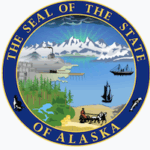 Alaska Ballot Measure: Voters will decide on a ballot initiative to repeal the state’s top-four ranked-choice voting system in 2026, unless the legislature approves substantially similar legislation during its upcoming session. This would be the second time that voters have considered an initiative to repeal RCV in Alaska. RCV was first adopted in 2020, with the approval of Measure 2. In 2024, voters decided on an initiative to repeal RCV, which was defeated—49.9% ‘Yes’ to 50.1% ‘No.’ This was the narrowest ballot measure result in Alaska’s history. On Dec. 31, 2025, Lt. Gov. Nancy Dahlstrom (R) announced that 42,837 signatures were verified across 40 House districts, exceeding the requirement of 34,098 qualified signatures from at least 30 House districts. In Alaska, a ballot initiative appears on the ballot at the first statewide election held at least 120 days after the legislature adjourns its session. The legislature could approve legislation that is “substantially the same as the proposed law,” rendering the initiative void. The legislative session is expected to begin Jan. 20 and adjourn May 20. If the legislature instead adjourned one month earlier, on April 20, the initiative would be eligible to appear on the August 18, 2026, primary ballot. Otherwise, it would appear on the November 3, 2026, general election ballot. The initiative would eliminate the state’s top-four ranked-choice voting (RCV) system, which combines top-four primaries with ranked-choice voting in general elections.
Alaska Ballot Measure: Voters will decide on a ballot initiative to repeal the state’s top-four ranked-choice voting system in 2026, unless the legislature approves substantially similar legislation during its upcoming session. This would be the second time that voters have considered an initiative to repeal RCV in Alaska. RCV was first adopted in 2020, with the approval of Measure 2. In 2024, voters decided on an initiative to repeal RCV, which was defeated—49.9% ‘Yes’ to 50.1% ‘No.’ This was the narrowest ballot measure result in Alaska’s history. On Dec. 31, 2025, Lt. Gov. Nancy Dahlstrom (R) announced that 42,837 signatures were verified across 40 House districts, exceeding the requirement of 34,098 qualified signatures from at least 30 House districts. In Alaska, a ballot initiative appears on the ballot at the first statewide election held at least 120 days after the legislature adjourns its session. The legislature could approve legislation that is “substantially the same as the proposed law,” rendering the initiative void. The legislative session is expected to begin Jan. 20 and adjourn May 20. If the legislature instead adjourned one month earlier, on April 20, the initiative would be eligible to appear on the August 18, 2026, primary ballot. Otherwise, it would appear on the November 3, 2026, general election ballot. The initiative would eliminate the state’s top-four ranked-choice voting (RCV) system, which combines top-four primaries with ranked-choice voting in general elections.
 Florida: A new bill aims to tighten Florida’s voter registration rules by requiring proof of citizenship and banning out-of-state voters. State Rep. Berny Jacques, R-Seminole, filed HB 985, which would require every voter to verify their citizenship before submitting a voter application. Additionally, the bill aims to remove people from the Florida voters’ registry who have obtained a driver license out of state. Under the bill, non-citizens will be required to have “NC” marked on the back of their Florida-issued IDs. In a statement announcing the proposed bill, Jacques wrote: “The future of our state and our nation depends on free and secure elections. We must stay committed to safeguarding our electoral process.” Jacques says the new voter laws are meant to strengthen election security in Florida by ensuring only eligible residents are allowed to vote.
Florida: A new bill aims to tighten Florida’s voter registration rules by requiring proof of citizenship and banning out-of-state voters. State Rep. Berny Jacques, R-Seminole, filed HB 985, which would require every voter to verify their citizenship before submitting a voter application. Additionally, the bill aims to remove people from the Florida voters’ registry who have obtained a driver license out of state. Under the bill, non-citizens will be required to have “NC” marked on the back of their Florida-issued IDs. In a statement announcing the proposed bill, Jacques wrote: “The future of our state and our nation depends on free and secure elections. We must stay committed to safeguarding our electoral process.” Jacques says the new voter laws are meant to strengthen election security in Florida by ensuring only eligible residents are allowed to vote.
 Maryland: Montgomery County’s delegation to the Maryland General Assembly is hoping 2026 will be the year a bill on ranked choice voting finally makes it across the finish line. The bill sponsored by the Montgomery County delegation would allow the County Council to adopt ranked choice voting for local elections. Voters in Montgomery County would still vote the traditional way in statewide contests. “We really like this bill, because the Montgomery County House delegation unanimously passed the bill in 2025, 2024, 2022, 2021 and 2019,” said Del. Aaron Kaufman (D-Dist. 18), the bill’s lead sponsor, during a Dec. 11 hearing held by the delegation. The ranked choice voting bill failed to advance out of committee in each of those years. According to Kaufman, previous attempts to enable ranked choice voting stalled after legislators raised concerns about different jurisdictions having different processes for elections. Opponents of ranked choice voting also argue that it makes both voting and administering elections overly complicated. “I know that the arc of progress is slow in Annapolis, and sometimes it takes many, many years for legislation to pass,” Kaufman said. “But I’m confident that this is common sense, good governance, pro-democracy legislation, and that it’ll pass one day.” The Maryland General Assembly is set to convene Jan. 14. Montgomery County legislators will stake their positions on the ranked choice voting measure and other local bills in delegation meetings before those bills are introduced in committee.
Maryland: Montgomery County’s delegation to the Maryland General Assembly is hoping 2026 will be the year a bill on ranked choice voting finally makes it across the finish line. The bill sponsored by the Montgomery County delegation would allow the County Council to adopt ranked choice voting for local elections. Voters in Montgomery County would still vote the traditional way in statewide contests. “We really like this bill, because the Montgomery County House delegation unanimously passed the bill in 2025, 2024, 2022, 2021 and 2019,” said Del. Aaron Kaufman (D-Dist. 18), the bill’s lead sponsor, during a Dec. 11 hearing held by the delegation. The ranked choice voting bill failed to advance out of committee in each of those years. According to Kaufman, previous attempts to enable ranked choice voting stalled after legislators raised concerns about different jurisdictions having different processes for elections. Opponents of ranked choice voting also argue that it makes both voting and administering elections overly complicated. “I know that the arc of progress is slow in Annapolis, and sometimes it takes many, many years for legislation to pass,” Kaufman said. “But I’m confident that this is common sense, good governance, pro-democracy legislation, and that it’ll pass one day.” The Maryland General Assembly is set to convene Jan. 14. Montgomery County legislators will stake their positions on the ranked choice voting measure and other local bills in delegation meetings before those bills are introduced in committee.
 Missouri: Rep. Will Jobe filed a resolution to start an impeachment investigation against Missouri’s Secretary of State. Jobe filed HR 3879 on January 7. He said that Missouri Secretary of State Denny Hoskins purposefully didn’t count 100,000 signatures on petitions concerning the redistricting of congressional districts. “Secretary Hoskins has abused his authority to try and silence the more than 300,000 Missourians who exercised their constitutional right to bring the redistricting bill to a statewide vote, betraying his oath to uphold the state constitution,” said Jobe, in a statement. House Minority Leader Ashley Aune, Kansas City, also made a statement. “If Missourians’ constitutional rights are to be more than just words on paper, then the House must fulfill its duty to protect those rights by launching an immediate investigation,” said Aune, in the release. According to KRCG, the legislation has little chance of moving forward in the Republican-led Missouri House of Representatives.
Missouri: Rep. Will Jobe filed a resolution to start an impeachment investigation against Missouri’s Secretary of State. Jobe filed HR 3879 on January 7. He said that Missouri Secretary of State Denny Hoskins purposefully didn’t count 100,000 signatures on petitions concerning the redistricting of congressional districts. “Secretary Hoskins has abused his authority to try and silence the more than 300,000 Missourians who exercised their constitutional right to bring the redistricting bill to a statewide vote, betraying his oath to uphold the state constitution,” said Jobe, in a statement. House Minority Leader Ashley Aune, Kansas City, also made a statement. “If Missourians’ constitutional rights are to be more than just words on paper, then the House must fulfill its duty to protect those rights by launching an immediate investigation,” said Aune, in the release. According to KRCG, the legislation has little chance of moving forward in the Republican-led Missouri House of Representatives.
 Nebraska: A group of state lawmakers sent a letter December 31, 2025 asking Secretary of State Bob Evnen to explain his “negotiations” with the federal government over the release of sensitive voter information. Five state senators, all Democrats, referred in their letter to correspondence they had with Evnen in October when they reminded him of an “obligation to protect Nebraska voter privacy from unwarranted federal overreach.” They said Evnen had indicated in a response at the time that he would not comply with the federal government’s request to turn over detailed voter information due to pending litigation. Wednesday’s letter was penned in light of a more recent news story published in the Nebraska Examiner Dec. 18, which led lawmakers to believe Evnen, a Republican, had been communicating with the DOJ regarding release of the data. State Sen. Margo Juarez of Omaha was joined in the request by Sens. Ashlei Spivey of Omaha, Danielle Conrad and Jane Raybould of Lincoln and Victor Rountree of Bellevue. The group sought to know more about the “timing and results of negotiations” between Evnen’s office and the feds.
Nebraska: A group of state lawmakers sent a letter December 31, 2025 asking Secretary of State Bob Evnen to explain his “negotiations” with the federal government over the release of sensitive voter information. Five state senators, all Democrats, referred in their letter to correspondence they had with Evnen in October when they reminded him of an “obligation to protect Nebraska voter privacy from unwarranted federal overreach.” They said Evnen had indicated in a response at the time that he would not comply with the federal government’s request to turn over detailed voter information due to pending litigation. Wednesday’s letter was penned in light of a more recent news story published in the Nebraska Examiner Dec. 18, which led lawmakers to believe Evnen, a Republican, had been communicating with the DOJ regarding release of the data. State Sen. Margo Juarez of Omaha was joined in the request by Sens. Ashlei Spivey of Omaha, Danielle Conrad and Jane Raybould of Lincoln and Victor Rountree of Bellevue. The group sought to know more about the “timing and results of negotiations” between Evnen’s office and the feds.
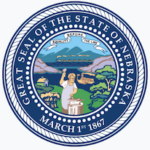 Nebraska Ballot Measure: new group of petition-gatherers will begin collecting signatures in the new year. A statewide coalition of community members and groups launched a signature-gathering drive today. They call it Respect Nebraska Voters. The idea is to make it more difficult for the Nebraska Legislature to weaken laws that Nebraskans adopted through the initiative process. Supporters cited a long list of laws that the legislature and state have worked to overturn. “We’ve seen why this protection is needed. After almost 75 percent of us voted for earned, paid sick leave just last year in 2024, the Nebraska Legislature took it away from 140,000 Nebraskans, a huge share of our workforce,” said Jo Giles, sponsor of the 2024 paid sick leave initiative. “And we’ve seen those same lawmakers vote to significantly undercut the minimum wage increases most Nebraskans voted for, making it more likely that future wages won’t keep up with our growing cost of living. We’ll likely see another effort to undercut that bill this session.”
Nebraska Ballot Measure: new group of petition-gatherers will begin collecting signatures in the new year. A statewide coalition of community members and groups launched a signature-gathering drive today. They call it Respect Nebraska Voters. The idea is to make it more difficult for the Nebraska Legislature to weaken laws that Nebraskans adopted through the initiative process. Supporters cited a long list of laws that the legislature and state have worked to overturn. “We’ve seen why this protection is needed. After almost 75 percent of us voted for earned, paid sick leave just last year in 2024, the Nebraska Legislature took it away from 140,000 Nebraskans, a huge share of our workforce,” said Jo Giles, sponsor of the 2024 paid sick leave initiative. “And we’ve seen those same lawmakers vote to significantly undercut the minimum wage increases most Nebraskans voted for, making it more likely that future wages won’t keep up with our growing cost of living. We’ll likely see another effort to undercut that bill this session.”
 New Hampshire: Voters requesting a ballot in New Hampshire could no longer be able to use an ID card issued by a college or high school under a measure that cleared the House this week. The Republican-backed bill passed on a 190-148 vote. It will now head to the New Hampshire Senate. Under New Hampshire’s voter ID laws, drivers licenses and other identification cards issued by a department of motor vehicles, along with passports and military identification, are acceptable forms of photo identification when requesting a ballot. Student identification cards issued by accredited public and private high schools, as well as colleges and universities in New Hampshire, have also been accepted under current law. The original version of the bill proposed other changes to the state’s voter identification law, including requiring only drivers licenses issued by the New Hampshire Department of Motor Vehicles be accepted. That language was stripped from the final version of the bill, however, meaning IDs issued by other states would still be accepted. House Republicans also passed a separate bill that seeks to end a rarely used provision in the state’s voter ID law that permits certain election officials to allow people to vote who don’t have an identification, as long as the official recognizes the person.
New Hampshire: Voters requesting a ballot in New Hampshire could no longer be able to use an ID card issued by a college or high school under a measure that cleared the House this week. The Republican-backed bill passed on a 190-148 vote. It will now head to the New Hampshire Senate. Under New Hampshire’s voter ID laws, drivers licenses and other identification cards issued by a department of motor vehicles, along with passports and military identification, are acceptable forms of photo identification when requesting a ballot. Student identification cards issued by accredited public and private high schools, as well as colleges and universities in New Hampshire, have also been accepted under current law. The original version of the bill proposed other changes to the state’s voter identification law, including requiring only drivers licenses issued by the New Hampshire Department of Motor Vehicles be accepted. That language was stripped from the final version of the bill, however, meaning IDs issued by other states would still be accepted. House Republicans also passed a separate bill that seeks to end a rarely used provision in the state’s voter ID law that permits certain election officials to allow people to vote who don’t have an identification, as long as the official recognizes the person.
 South Dakota: Secretary of State Monae Johnson is asking the Legislature to permit county auditors to use ballot-on-demand systems, which print an official ballot on an as-needed basis. The change proposed in Senate Bill 28 would, if approved, take effect immediately. It is one of seven measures that Johnson’s office has pre-filed in advance of the 2026 legislative session that officially starts on Tuesday, January 13. The secretary of state oversees elections in South Dakota, while county auditors run them. Other changes in state election law sought by Johnson include: Senate Bill 29 would amend provisions pertaining to the tabulation of ballots and permit the release of any cast vote record and collection of ballot images produced by automatic tabulating equipment. Senate Bill 30 would expand the reasons for challenging an individual’s eligibility to vote by adding the requirement that a person be a U.S. citizen. Senate Bill 31 would permit the use of a confirmation letter to verify a voter’s registration. Senate Bill 32 would reduce the number of ballots a voter receives by adding to the official ballot the names of non-partisan judicial candidates and the names of candidates for political parties’ precinctman and precinctwoman. Those offices previously have been on separate ballots. Senate Bill 33 would modify the number of signatures required on certain election-related petitions. Senate Bill 34 would make various changes regarding combined elections for school board and municipal offices.
South Dakota: Secretary of State Monae Johnson is asking the Legislature to permit county auditors to use ballot-on-demand systems, which print an official ballot on an as-needed basis. The change proposed in Senate Bill 28 would, if approved, take effect immediately. It is one of seven measures that Johnson’s office has pre-filed in advance of the 2026 legislative session that officially starts on Tuesday, January 13. The secretary of state oversees elections in South Dakota, while county auditors run them. Other changes in state election law sought by Johnson include: Senate Bill 29 would amend provisions pertaining to the tabulation of ballots and permit the release of any cast vote record and collection of ballot images produced by automatic tabulating equipment. Senate Bill 30 would expand the reasons for challenging an individual’s eligibility to vote by adding the requirement that a person be a U.S. citizen. Senate Bill 31 would permit the use of a confirmation letter to verify a voter’s registration. Senate Bill 32 would reduce the number of ballots a voter receives by adding to the official ballot the names of non-partisan judicial candidates and the names of candidates for political parties’ precinctman and precinctwoman. Those offices previously have been on separate ballots. Senate Bill 33 would modify the number of signatures required on certain election-related petitions. Senate Bill 34 would make various changes regarding combined elections for school board and municipal offices.
Legal Updates
 U.S. Department of Justice: The U.S. Department of Justice filed suit against two more states this week. DOJ is suing Arizona and Connecticut for their unredacted voter lists. The agency has said it is asking every state for its unredacted voter lists — unprecedented requests for versions of the voter rolls that contain personally identifying information such as voters’ full birthdates, full or partial Social Security numbers, and driver’s license information — as part of an Administration effort to exercise new oversight over the maintenance of state voter rolls. In the suit against Arizona, the department cited the Civil Rights Act’s requirement for states to turn over certain voting records to the Justice Department upon the attorney general’s request, and also cited the requirement for states to comply with two federal election laws, the National Voter Registration Act and the Help America Vote Act. “I am not surprised that Connecticut has been added to the long list of states being sued on these grounds,” said Connecticut Secretary of State Stephanie Thompson. “As Secretary of the State, my foremost responsibility is to the voters of Connecticut who entrust the state and their local election officials with sensitive data so they can participate in our representative democracy without fear that their information will be misused or exposed. As Connecticut knows, our office takes election integrity seriously, and we follow the law while making sure our elections remain accessible, secure, and transparent. That balance is essential to maintaining public trust, and it’s something I will continue to protect.”
U.S. Department of Justice: The U.S. Department of Justice filed suit against two more states this week. DOJ is suing Arizona and Connecticut for their unredacted voter lists. The agency has said it is asking every state for its unredacted voter lists — unprecedented requests for versions of the voter rolls that contain personally identifying information such as voters’ full birthdates, full or partial Social Security numbers, and driver’s license information — as part of an Administration effort to exercise new oversight over the maintenance of state voter rolls. In the suit against Arizona, the department cited the Civil Rights Act’s requirement for states to turn over certain voting records to the Justice Department upon the attorney general’s request, and also cited the requirement for states to comply with two federal election laws, the National Voter Registration Act and the Help America Vote Act. “I am not surprised that Connecticut has been added to the long list of states being sued on these grounds,” said Connecticut Secretary of State Stephanie Thompson. “As Secretary of the State, my foremost responsibility is to the voters of Connecticut who entrust the state and their local election officials with sensitive data so they can participate in our representative democracy without fear that their information will be misused or exposed. As Connecticut knows, our office takes election integrity seriously, and we follow the law while making sure our elections remain accessible, secure, and transparent. That balance is essential to maintaining public trust, and it’s something I will continue to protect.”
 Arizona: Cochise County Supervisor Tom Crosby cannot claim he has legislative immunity as he defends himself in a felony case stemming from his refusal to certify the 2022 election after the Arizona Supreme Court this week refused to hear his appeal. Last year, the appeals court upheld a lower court’s ruling that Crosby was not protected by legislative immunity when he and fellow Republican Supervisor Peggy Judd refused to certify the results of Cochise County’s election by the deadline set in state law. Supervisor Ann English, a Democrat, was the sole member who dissented and voted to proceed with certification. Crosby hoped the high court would take up the matter, but it declined to do so without comment. The Cochise County Board of Supervisors only certified the results after being ordered by a judge to do so, but after the Nov. 28 certification deadline, putting the county’s votes at risk of not being counted. In 2023, Judd pleaded guilty to a lesser charge of refusing to perform the duty of an election officer, a misdemeanor, as part of a plea deal. Judd retained her right to vote and her seat on the county board and was sentenced to 90 days of unsupervised probation and ordered to pay a $550 fine. However, Crosby has continued to fight the felony charges against him, asking a Maricopa County Superior Court judge to dismiss them, arguing that his actions were protected by legislative immunity and that they were improperly filed in Maricopa County. That motion to dismiss was denied and Crosby asked the Court of Appeals to reverse it, but his appeal was rejected after the appeals court agreed with the lower court and unanimously concluded that legislative immunity does not apply to the board’s failure to certify election results.
Arizona: Cochise County Supervisor Tom Crosby cannot claim he has legislative immunity as he defends himself in a felony case stemming from his refusal to certify the 2022 election after the Arizona Supreme Court this week refused to hear his appeal. Last year, the appeals court upheld a lower court’s ruling that Crosby was not protected by legislative immunity when he and fellow Republican Supervisor Peggy Judd refused to certify the results of Cochise County’s election by the deadline set in state law. Supervisor Ann English, a Democrat, was the sole member who dissented and voted to proceed with certification. Crosby hoped the high court would take up the matter, but it declined to do so without comment. The Cochise County Board of Supervisors only certified the results after being ordered by a judge to do so, but after the Nov. 28 certification deadline, putting the county’s votes at risk of not being counted. In 2023, Judd pleaded guilty to a lesser charge of refusing to perform the duty of an election officer, a misdemeanor, as part of a plea deal. Judd retained her right to vote and her seat on the county board and was sentenced to 90 days of unsupervised probation and ordered to pay a $550 fine. However, Crosby has continued to fight the felony charges against him, asking a Maricopa County Superior Court judge to dismiss them, arguing that his actions were protected by legislative immunity and that they were improperly filed in Maricopa County. That motion to dismiss was denied and Crosby asked the Court of Appeals to reverse it, but his appeal was rejected after the appeals court agreed with the lower court and unanimously concluded that legislative immunity does not apply to the board’s failure to certify election results.
 New Hampshire: Magistrate Judge Andrea Johnstone of the U.S. District Court of New Hampshire has allowed four New Hampshire residents to join a legal fight with the Trump administration over access to the state’s voter file. Johnstone ruled this week that the residents could join the Secretary of State’s Office in opposing efforts by the U.S. Department of Justice to force a handover of state voter information. Moving forward, the residents — liberal activist Louise Spencer; former Republican state Rep. Neal Kurk; former Democratic state Rep. Bob Perry; and Portsmouth attorney Christopher Cole — will be treated as co-defendants against the federal lawsuit. “Even assuming that the proposed intervenors’ interest is adequately represented by defendants, their presence in this suit will assist the court in the just and equitable adjudication of this matter,” Johnstone wrote. After initially opposing the residents’ inclusion as co-defendants, Justice Department lawyers reversed course in December, telling the court it had “no position” on the matter. That reversal came days after the U.S. District Court of Michigan approved a similar request for two voters and the Michigan Alliance for Retired Americans to intervene as co-defendants with the state.
New Hampshire: Magistrate Judge Andrea Johnstone of the U.S. District Court of New Hampshire has allowed four New Hampshire residents to join a legal fight with the Trump administration over access to the state’s voter file. Johnstone ruled this week that the residents could join the Secretary of State’s Office in opposing efforts by the U.S. Department of Justice to force a handover of state voter information. Moving forward, the residents — liberal activist Louise Spencer; former Republican state Rep. Neal Kurk; former Democratic state Rep. Bob Perry; and Portsmouth attorney Christopher Cole — will be treated as co-defendants against the federal lawsuit. “Even assuming that the proposed intervenors’ interest is adequately represented by defendants, their presence in this suit will assist the court in the just and equitable adjudication of this matter,” Johnstone wrote. After initially opposing the residents’ inclusion as co-defendants, Justice Department lawyers reversed course in December, telling the court it had “no position” on the matter. That reversal came days after the U.S. District Court of Michigan approved a similar request for two voters and the Michigan Alliance for Retired Americans to intervene as co-defendants with the state.
 Wyoming Gov. Mark Gordon has directed the state Attorney General’s office to seek the removal of Weston County Clerk Becky Hadlock, he announced this week. “The Governor believes the Weston County Clerk has committed several acts of misconduct or malfeasance including her failure to appear for a legislative subpoena and her filing of a false audit report in conjunction with her duties as the Clerk of Weston County,” his office said in a statement. According to WyoFile, the issue dates back to the 2024 general election when Hadlock caused an initial ballot miscount in her county’s results after using the wrong ballots, resulting in a dramatic undercount in the vote for Speaker of the House Chip Neiman, who was running unopposed. Ultimately, a hand count sorted out the results, but the problem remained unresolved for many local voters who took issue with an initial post-election audit. Additional issues arose: One pertained to allegations that Hadlock filed a false post-election audit. The second accused her of defying a legislative subpoena. In October, Gordon received a verified complaint from four qualified electors of Weston County. That set off a process, as outlined in state law, that tasks the governor with determining whether to recommend the attorney general seek the removal of an elected official in district court. This is the second time Gordon has been tasked with investigating Hadlock over her actions in the 2024 election. In the first investigation, Gordon decided that Hadlock “made many serious mistakes,” but “her actions do not rise to the level of misconduct or malfeasance, as I understand the meaning of those terms in this situation.” Since then, Hadlock failed to appear before a legislative body despite a subpoena to do so. The second complaint pointed to that decision, in addition to the post-election audit.
Wyoming Gov. Mark Gordon has directed the state Attorney General’s office to seek the removal of Weston County Clerk Becky Hadlock, he announced this week. “The Governor believes the Weston County Clerk has committed several acts of misconduct or malfeasance including her failure to appear for a legislative subpoena and her filing of a false audit report in conjunction with her duties as the Clerk of Weston County,” his office said in a statement. According to WyoFile, the issue dates back to the 2024 general election when Hadlock caused an initial ballot miscount in her county’s results after using the wrong ballots, resulting in a dramatic undercount in the vote for Speaker of the House Chip Neiman, who was running unopposed. Ultimately, a hand count sorted out the results, but the problem remained unresolved for many local voters who took issue with an initial post-election audit. Additional issues arose: One pertained to allegations that Hadlock filed a false post-election audit. The second accused her of defying a legislative subpoena. In October, Gordon received a verified complaint from four qualified electors of Weston County. That set off a process, as outlined in state law, that tasks the governor with determining whether to recommend the attorney general seek the removal of an elected official in district court. This is the second time Gordon has been tasked with investigating Hadlock over her actions in the 2024 election. In the first investigation, Gordon decided that Hadlock “made many serious mistakes,” but “her actions do not rise to the level of misconduct or malfeasance, as I understand the meaning of those terms in this situation.” Since then, Hadlock failed to appear before a legislative body despite a subpoena to do so. The second complaint pointed to that decision, in addition to the post-election audit.
Opinions This Week
National Opinions: Covering elections | What to expect in 2026 | U.S. Postal Service Changes, II
California: Ranked choice voting
Florida: Lee County
Illinois: Ranked choice voting
Mississippi: Secretary of state
Ohio: Dropboxes | Grace periods
Pennsylvania: History of voting systems
South Carolina: List maintenance
Virginia: Democracy
Upcoming Events
Southern Political Science Association 2026 Conference: Experience Southern’s Hospitality at the 2026 SPSA Conference in New Orleans! The 2026 SPSA Preliminary Program is available HERE. Updates will be made periodically to the program, so please refer to this page for the most updated version available. When: January 14-17. Where: New Orleans
Illinois Association of County Recorders and Clerks Winter Conference: The Illinois Association of County Recorders and Clerks will host its Winter Conference at the Par-A-Dice Hotel in East Peoria. When: January 14-16. Where: East Peoria.
Wisdom of the Crowds: Citizens’ assemblies have moved from experimental tools to proven methods for solving complex public problems and strengthening trust—between residents and their government, within communities, and in people’s own capacity to engage with hard issues. The next frontier is shifting from one-off, ad hoc assemblies to models of repeated use. This public event explores what it takes and what it means for governments to meaningfully absorb and act on assemblies’ recommendations as a matter of routine, rather than an exceptional break from conventional politics. We will examine how ideas travel from participants to staff, across departments, and ultimately to elected officials. We’ll also consider why a government might commit to holding an assembly on a regular basis (such as every year), and what benefits, opportunities, risks, and challenges arise from that commitment. In addition, the discussion will surface the structures, skills, and resources needed to make recurring assemblies possible—and, time permitting, what a fully institutionalized assembly might look like in the United States. This panel brings together on-the-ground leaders across the country including government representatives and civic organizers to share practical lessons with an audience of citizens’ assembly implementers from across the United States and Canada. This event is sponsored by FIDE North America, the National Civic League, and New America’s Political Reform program. The panel discussion will take place from 4:00–5:00 p.m., with a reception to follow. When: January 15. Where: Washington, DC.
iGO Midwinter Conference: The International Association of Government Officials will hold its Midwinter Conference in Albuquerque, New Mexico from January 19-23, 2026. Please visit the iGO website for more information and to register. When: January 19-23. Where: Albuquerque
Help America Vote Day: National Poll Worker Recruitment Day and Help America Vote Day were established by the U.S. Election Assistance Commission (EAC) to inspire civic engagement and encourage people to sign up to become a poll worker. The EAC will recognize January 27, 2026 as Help America Vote Day, and August 11, 2026, as National Poll Worker Recruitment Day. These efforts aim to address the continued need for poll workers to sign up to Help America Vote and strengthen our democracy. When: January 27. Where: Everywhere.
2026 NASS Winter Conference: The National Association of Secretaries of State will hold its 2026 Winter Conference in Washington, DC from January 28-31. Please refer to the NASS website for more information about the event and to register. When: January 28-31. Where: Washington, DC.
First Amendment Originalism: In January 1976, the Supreme Court issued its ruling in Buckley v. Valeo, a landmark decision on the extent to which the First Amendment’s free speech clause protects contributions to political campaigns and their expenditures. Fifty years later, the Supreme Court is set to rule in another case on campaign finance and free speech, but the Court’s jurisprudential makeup is considerably different. While a majority of Supreme Court justices identify as originalists, little legal scholarship has been dedicated to understanding the free speech clause according to its original public meaning. Please join AEI for an event cohosted with the Catholic University of America’s Center for the Constitution and the Catholic Intellectual Tradition on the original meaning of the First Amendment’s free speech guarantees. When: January 29. Where: Washington, DC.
2026 NASED Winter Conference: Twice a year, National Association of State Election Directors members gather to discuss the latest developments in election administration. Members of the public are welcome to attend at the non-member registration rate. Please refer to the NASED website for information about the 2026 Winter Conference. When: Feb. 1-3, 2026. Where: Washington, DC.
Oregon Association of County Clerks (OACC) Mid Winter Conference: The Oregon Association of County Clerks hosts two conferences every year. The Mid-Winter Conference is held in Marion County and the Annual Conference is held in the county of the current OACC President. When: February 2-5. Where: Salem.
Massachusetts Town Clerks Association (MTCA) Winter Conference: The Massachusetts Town Clerks Association will hold its Winter Conference at the Devens Commons Center in Devens. When: February 4-6. Where: Devens.
130th Annual County and District Clerks’ Association of Texas (TAC) Conference: The County and District Clerks’ Association of Texas will hold its annual conference in San Marcos. When: February 10-13. Where: San Marcos
EAC Election Audit Standards Hearing: On Wednesday, February 18, join the U.S. Election Assistance Commission (EAC) for a hearing on Election Audit Standards in the agency’s Washington, DC hearing room. During the event, election officials and audit professionals will discuss ways they are effectively using audits to boost public trust in elections. This event will be livestreamed on the EAC’s YouTube channel and held in person. When: February 18, 1:30pm Eastern. Where: Online and Washington, DC.
2026 NACo Legislative Conference: The NACo Legislative Conference brings together nearly 2,000 elected and appointed county officials to focus on federal policy issues that matter most to county governments. Attendees will experience timely, high-impact policy sessions and will interact with executive branch officials, members of Congress and their staff. When: February 21-24. Where: Washington, DC.
Election Center February Workshop: Focusing on interaction and sharing of practices selected by members to receive People’s Choice Awards, the February Workshops formalize those critical conversations that happen at conferences during meals, in the hallways, & the hotel lobby. The agenda augments the award-winning member presentations with applicable research and resources.Two CERA core courses and one renewal will be held following the workshop. When: February 25-27. Where: Jacksonville, Florida.
Election Center April Workshop: In April, the focus is on state associations and state trainings both by modeling conference formats, facilitation techniques, and potential content resources. The Coalition of Election Association Leaders (CEAL) guides state groups in their maturation process with mentorship and networking opportunities. When: April 22-24. Where: Chicago.
Job Postings This Week
electionlineWeekly publishes election administration job postings each week as a free service to our readers. To have your job listed in the newsletter, please send a copy of the job description, including a web link to mmoretti@electionline.org. Job postings must be received by 5pm on Wednesday in order to appear in the Thursday newsletter. Listings will run for three weeks or till the deadline listed in the posting.
Account Manager, Electask– Electask is a fast-growing company transforming how election officials manage their operations. Our task and poll worker management software empowers election administrators – the backbone of democracy – to run elections more efficiently and with greater confidence. Right now, we’re a two-person team, and this is the first sales hire. That means we’re looking for someone who’s not just great at closing deals but also can professionalize the sales function. We see opportunity for this position to eventually lead a full sales team and be a core member of our growth as we scale. We’re planning on a base of $50,000 – $60,000 for this role with OTE of $125,000. If you crush it, there is the ability for this role to make $200,000+. What You’ll Do: Be a crucial team member on outbound sales – prospecting, outreach and closing deals, alongside the CEO. This includes email outreach, hitting the phones, and creating long-term relationships with election administrators. Travel to 10+ conferences per year across the country, building relationships with election officials. Visit some lovely places and some that you barely know exist – Lake Tahoe, San Diego, South Padre Island, Amarillo, etc. Work directly with decision-makers in county governments, demonstrating how Electask can improve their operations. Elections officials are extremely kind and are always looking for new and innovative solutions. Help refine our go-to-market approach and lay the foundation for a larger sales team as we grow. Application: For the complete job listing and to apply, click here.
Director of Election Information Technology, King County, Washington– King County Elections (KCE) seeks a dynamic and visionary leader to serve as our Director of Elections Information Technology (Division Director – Technology). The Director of Elections Information Technology will report to the elected Director of Elections, serve as a member of the Department’s Leadership Team, and lead and support a highly skilled team to achieve excellence in election technology, security, and administration. This role will play a key part in developing departmental goals, strategies, and initiatives, driving the adoption of new technologies within KCE, and fostering a culture of innovation and collaboration. This is a unique opportunity to inspire and empower a team, drive the adoption of new technologies within KCE, identify opportunities to bring innovation to the forefront of our operations, and significantly impact the future of election administration in one of the most populous and diverse counties in the United States. This is a hybrid position that performs work remotely and on-site. As a leadership team member, this position is expected to work on-site frequently during active elections. Salary: $166,509 – $211,060. Application: For the complete job listing and to apply, click here.
Director of Elections & Registration, Cobb County, Georgia– The purpose of this classification is to plan, direct and oversee the operations and staff involved in voter registration and election processes for the County under the general oversight of the Board of Elections and Registration, including, but not limited to, conducting federal, state, county and municipal elections, registering voters, and maintaining voter lists, and to ensure such processes are carried out in compliance with local, state, and federal election and voter registration laws, rules, and regulations. The Director of Elections & Registration oversees the operations and staff of the Elections & Registration Department that serve the over 500,000 registered voters of Cobb County. While the department is funded by Cobb County Government, it is governed by a 5-member citizen board comprised of two members appointed by the Cobb County Legislative Delegation, one member appointed the Chair of the Cobb County Board of Commissioners and one member each appointed by the county Democratic and Republican parties. Salary: Up to $180,000 (Depending On Experience). Deadline: January 12. Application: For the complete job listing and to apply, click here.
Election Administrator, Victoria County, Texas–Performs vital work planning, organizing, coordinating, and managing federal, state, and local elections plus all facets of voter registration processes in accordance with the Texas Election Code, and other applicable federal, state, or local laws and regulations, including administrative direction from the Texas Secretary of State. Ensuring smooth elections operations including inputting and maintaining voter registration databases, training and supervising poll works, preparing staffing and logistics for voting, administering early voting by mail and in-person, supervising balloting & tabulation, and preparing final canvassing reports. Coordinating closely with political party chairs in conducting primary, runoff, and general elections while guaranteeing impartiality. Preserving voter registration applications, official election documents, and candidate campaign filings/disclosures. Salary: $61,494 – $76,868. Application: For the complete job listing and to apply, click here.
Election Operations & Workforce Manager, Charleston County, South Carolina– The Board of Voter Registration and Elections is an award-winning organization dedicated to excellence in electoral processes. Our mission is to daily serve the Charleston County voting constituency with Vigilance, Objectivity, and Transparency in a manner that promotes due diligence Excellence in all aspects of Elections Management. We are committed to continuous improvement, innovative practices, and exceptional service to our community, ensuring every voter’s voice is heard. Are you driven by a passion for democracy and civic engagement? Join the Board of Voter Registration and Elections as the Election Operations and Workforce Manager and play a critical role in delivering seamless, fair, and accessible elections. Key Responsibilities: Poll Worker Recruitment and Management; Polling Location Management; Liaison and Community Engagement; Support for Election Operations on Election Day and Early Voting; and Team Leadership. Salary: $68,140 – $89,252. Application: For the complete job listing and to apply, click here.
Regional Sales Director – Pacific West, Runbeck–The Regional Sales Director is responsible for leading high-value sales efforts, managing key client relationships, and driving revenue growth through strategic account development. This role requires a seasoned sales professional with a proven record of exceeding sales targets, developing new business opportunities, and nurturing long-term client partnerships. The Regional Sales Director acts as a trusted advisor to clients, aligning solutions with their business objectives while contributing to the company’s overall sales strategy and success. Territory will cover California, Nevada, Oregon, Washington, Alaska and Hawaii. Application: For the complete job listing and to apply, click here.
Election Software Specialist, Printelect– Printelect is a dynamic and well-established regional election technology & services company with a proven track record in ballot printing, mail services, and a diverse portfolio of election products. With over fifty employees and one hundred twenty years of industry-leading experience, we take pride in our commitment to excellence and customer satisfaction. We partner with local governments throughout Virginia, North Carolina, South Carolina, and Georgia to provide products, services, and support for the conduct and administration of Federal, State, and local elections. Job Duties and Responsibilities: Work with our county and city official customers to translate their jurisdictional requirements and candidate data into formats used by voting equipment software. Utilize proprietary election management software, Microsoft Office, and Adobe Suite to build jurisdiction-specific databases, format paper and electronic ballots, and configure voting equipment to utilize those datasets. Provide phone and on-site support for our customers and troubleshoot any issues that arise. Communicate and cross-train with internal departments to facilitate accurate election preparation and good customer service. Develop a comprehensive understanding of all manufacturer hardware and software manuals, and be able to effectively communicate that information to team members and customers. Stay up to date on all new software updates and hardware offerings. Participate in on-site customer training and election day support. Salary: $55,000-60,000. Application: For the complete job listing and to apply, click here.
Research & Policy Analyst, City of Richmond – The Office of Elections is seeking to hire a Research and Policy Analyst (Legal Advisor). The Research and Policy Analyst (Legal Advisor) position is responsible for conducting thorough research and analysis to support election staff, candidates, political committees and other entities throughout the election cycle. The position helps ensure compliance with state and local election laws related to candidate qualifications, ballot access, filing requirements, and campaign documentation. The role will also help draft policies and procedures to ensure elections are conducted in compliance with all aspects of local, state and federal law related to election administration, voter registration, and elections, more broadly. Salary: $71,875 – $113,000. Deadline: January 14. Application: For the complete job listing and to apply, click here.
Training Program Manager, Charleston County, South Carolina– Democracy works best when every election runs flawlessly—and that starts with exceptional training. As Training Manager for the Board of Voter Registration and Elections, you’ll empower our poll managers and staff to deliver elections that are fair, accessible, and trusted by every voter in Charleston County. The Board of Voter Registration and Elections is an award-winning organization dedicated to excellence in electoral processes. Our mission is to daily serve the Charleston County voting constituency with Vigilance, Objectivity, and Transparency in a manner that promotes due diligence Excellence in all aspects of Elections Management. We believe that people are the foundation of successful elections. That’s why training is not just a task—it’s a core function of our mission. When our teams are prepared, voters can be confident that their voice will be heard, and their ballot counted. As Training Manager, you are not simply teaching procedures—you are building trust in the democratic process. You will design and deliver training that helps every poll manager, staff member, and Board member understand the importance of their role, perform it with confidence, and meet the highest standards of service to our voters. Salary: $68,140.00 – $82,000.00 Annually. Application: For the complete job listing and to apply, click here.
Voter Services Manager, City of Richmond – The City of Richmond Office of Elections is seeking a highly organized and knowledgeable Voter Services Manager. The purpose of the position is to provide management of and administrative assistance for all aspects of voter registration, and absentee services to the Office of the General Registrar. This includes voter registration procedures and the sequence of absentee ballot processes during an election cycle. The incumbent must be able to multi-task and demonstrate sound, independent judgement. The incumbent must have the ability to prioritize, organize and evaluate work; determine appropriate action and adjust workloads according to deadlines and other program requirements. Experience in dealing effectively with a broad range of people in a business environment, with members of the community and with the public is essential. The incumbent in this position will be required to work within adhere to, interpret, apply and explain federal and state regulations, policies and procedures and respond in writing and verbally. Salary: $2,147.12 – $3,319.46 Biweekly. Deadline: January 15. Application: For the complete job listing and to apply, click here.
Marketplace
electionline provides no guarantees as to the quality of the items being sold and the accuracy of the information provided about the sale items in the Marketplace. Ads are provided directly by sellers and are not verified by electionline. If you have an ad for Marketplace, please email it to: mmoretti@electionline.org